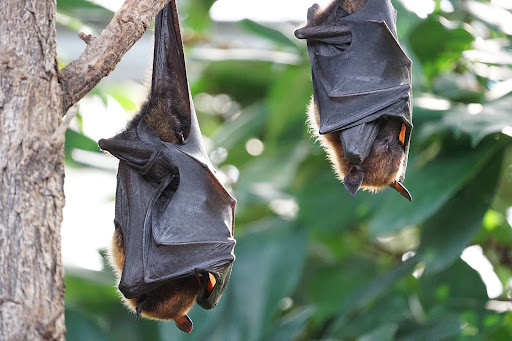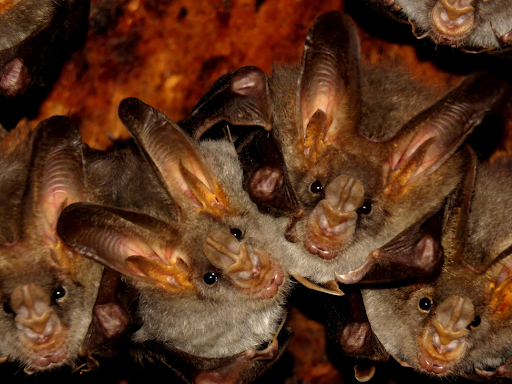Science Sunday: Bats
Bats live all over the world and are very important to the ecosystem.
- As bats drink nectar from inside flowers, they pick up pollen and move it from plant to plant. This is called pollination.
- Bats also spread seeds from trees and bushes. Plants that are a food source for humans, such as bananas, mangoes, cashews, dates, avocadoes, peaches, cloves, and figs, rely on bats to pollinate them.
- Bats eat a large number of insects, which helps to protect crops. They love to eat mosquitos which protects humans from mosquito bites as well as from the various diseases that mosquitoes carry, such as the Zika virus, West Nile virus, and malaria.
- The saliva of vampire bats contains an anticoagulant (a substance which keeps blood from clotting). Scientists are studying this chemical to determine if it can be used to help humans who suffer from heart issues.
Bat manure is called guano which can be used as a powerful fertilizer for lawns and gardens.
See if you can answer these questions using the resources linked below. (This type of investigation is called a “webquest”, and you often learn loads of other information while searching for the answers to specific questions.)
- How many different species of bats exist in the world?
- Which species of bat is the largest and how big do those types of bats grow?
- Since nocturnal bats hunt at night, how do they locate the insects they like to eat? How many insects can a bat eat each night?
- A bat’s wing is made of long finger-like bones. What “finger” sticks out of the top of a bat’s wing, helping it to crawl and climb?
- Bats are the only mammal that can do this…?
- What is the name of a disease that has been causing the deaths of many bat populations?
- Bats hang out in groups called…?
- In addition to caves, where might bats roost?
- How many babies do female bats give birth to each year?
- What are baby bats called?
 Read About It
Read About It
The Nature Conservancy: Amazing Facts About Bats
https://www.nature.org/en-us/about-us/where-we-work/united-states/arizona/stories-in-arizona/top-10-bat-facts/
U.S. Department of the Interior: 13 Awesome Facts About Bats
https://www.doi.gov/blog/13-facts-about-bats
National Park Service
Discover the Secret Lives of Bats
https://www.nps.gov/subjects/bats/index.htm
Carlsbad Caverns: Bats
https://www.nps.gov/cave/learn/nature/bats.htm
National Geographic Kids
5 Reasons Why Bats Are the Best
https://kids.nationalgeographic.com/5-reasons-why/article/5-reasons-bats-are-best
Amazing Bats of Bracken Cave
https://kids.nationalgeographic.com/nature/article/amazing-bats-of-bracken-cave
Bat Facts for Kids
https://kids.kiddle.co/Bat
U.S. Fish & Wildlife Service
https://fws.gov/midwest/news/ImportanceOfBats.html
Watch & Learn
All About Bats for Kids
https://www.youtube.com/watch?v=FLB6EmrL4Xc
National Geographic Kids: Cool Facts About Bats
https://www.youtube.com/watch?v=NBCODnTUOrY
Play & Learn
Bat Crafts
https://kidscraftroom.com/20-best-bat-crafts/
https://www.dltk-holidays.com/halloween/bat_crafts.html
Bat Masks
https://www.batcon.org/about-bats/games-and-activities/bat-masks/
Games
The Bat Moth Game
https://www.learnaboutbats.com/fun-things-to-do/games/
Bat games as well as downloadable crossword and jigsaw puzzles https://sciencetrek.org/sciencetrek/topics/bats/games.cfm
Fun Activities (coloring pages, word searches, etc.)
Coloring pages
http://www.supercoloring.com/coloring-pages/mammals/bats
https://www.crayola.com/free-coloring-pages/print/halloween-bats-coloring-page/
Dot to Dot
http://www.supercoloring.com/dot-to-dots/bat
How many words can you make from the word “echolocation”?
Bat Jokes and Puns
https://kidadl.com/articles/the-best-bat-puns-and-jokes-for-your-kids
https://funkidsjokes.com/bat-jokes/
